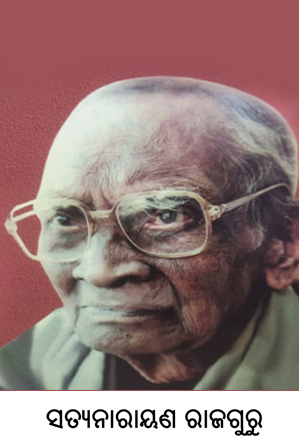Dr. Satyanarayana Rajguru
Died :- 11-Jun-1997
Place of Birth :- Parlakhemundi, Gajapati

Widely known epigraphist, archaeologist, research scholar, historian and litterateur Satyanarayana Rajguru was born to parents Harikrushna Rajguru and Sunamani Devi in Paralakhemundi of Gajapati district, Odisha on 19 August 1903. There were a very few epigraphists of his stature in the whole of India. Rajguru was highly proficient in seven languages, Besides Odia – English, Sanskrit, Telugu, Bengali, Hindi, Pali and Prakrut.
Rajguru did his higher courses in Odia and Sanskrit from Andhra University. He also privately passed a course in Indology from the same university later. He started his career in 1929 as the manager of Parala Padmanabha Rangalaya, the first theatre in Odisha, founded by Padmanabha Narayan Dev, erstwhile Raja of the state of Parlakhemundi. During his tenure there, he was associated with the activities of Utkal Sammilani. He assisted the Maharaja, Krushna Chandra Gajapati, in the fight for a separate state of Odisha unifying the Odia-speaking tracts lying scattered under the Madras presidency, Calcutta presidency and Bihar.
Rajguru, after his tenure as the president of the Ganjam District Education Council (1942–45), worked as an assistant at the Kalinga Historical Research Society at Bhawanipatna from 1947 and, later, joined Odisha State Museum as a curator (1950–61). From 1963 to 1970 he worked there as an epigraphist. He was a member of the working committee of Odisha Sahitya Academy and the chairman of Paralakhemundi Municipality. He was a life member of Berhampur University and was awarded honorary D. Litt by the university.
Rajguru is known to have done notable research on the history of Odisha and is credited with findings on the early life of Jayadev, the thirteenth century Sanskrit poet and the author of Gita Govinda. He established with evidence that Jayadev was an Odia poet and was born in Kendubilwa or Kunduli village in Puri district. He translated The Palanquin Bearers, a poem by Sarojini Naidu into Odia language under the title Palinki Bahaka and published several other works, some of which are prescribed as textbooks for university studies. His works include:
‘Inscriptions of Orissa’ (vol.1 to vol.V), ‘History of the Gangas’ (parts 1 and 2), ‘Invocatory Verses from the Inscriptions’ (vol.1 and 2), ‘Inscriptions of the Temples of Puri and Origin of Lord Purushottama-Jagannath’ (vol. 1 and 2), ‘Sri Jagannath Sthala Bruttantam’ (Translated from Telugu to English), The Korasanda Copper Plate, Grant of Visakhavarma, History of Eastern Gangas of Kalinga, Heiroglyphic Letters of Naraj, The Odras and their Predominance, The Historical Research in Orissa, The Kunduli Copper Plate, Grant of Narasimha Dev of Saka 1305, Sumandal Plates of Dharmaraj, Ranpur plates of Dharmaraj, Historical Background of Gopinath & Radha Krishna, Oriya Inscription on a Stone Image, South Indian Inscriptions, Naga Itihas (Part-1), Odishar Itihas, Odishar Sanskutik Itihas, (3rd & 4th part), Odia Lipira Kramabikash, Odia Upabhasha, Odia Bhasha O Lipi, Shri Purushottam O Shri Mandir, Odishar Samkhipta Itihas, Kalingara Aatmakatha,
Besides, he wrote : Radhabhishek, Gajapati, Shri Jayadev O Geeta Govind (plays), Janani Utkal (long semi-epic poetry), Manorama (Historical epic poetry), Chandrakala Natika (Ed), Gopabandhu Gadya Sahitya (Ed.), Prastab Chintamani (Sanskrit), Mo Jeevan Sangram (autobiography - Part-1) and Prachin Utkal Rajaprashastimala (Sanskrit).
His works so far unpublished include : Krushi Parashar (Sanskrit), Halayudha Kavya (Sanskrit), Naga Itihas (Part-2), Mo Jeevan Sangram (autobiography – Part-2), Chitra, Karnatakumari, Kharavel, Dharma Avtar, Ashok and Kalinga Bijaya (plays) etc. Over 500 research papers authored by Rajguru in both Odia and English were published in various journals.
Satyanarayana Rajguru died on 11 June, 1997 at the age of 93. His wife Taramani Devi had passed away one year earlier. He is survived by three sons.
Rajguru was awarded India’s fourth highest civilian honour Padma Shri in 1974 by the Government of India. He received the Kendra Sahitya Akademi Award for his autobiography Mo Jeevana Sangrama in 1996. He was also a recipient of Bharati Bhushan award from Andhra Mahasabha, Ganjam Sahitya Sammilani award (1968), Odisha Sahitya Academy award (1968) and Sarala Sanman from Sarala Sansad in 1989 in recognition of his invaluable contribution to history, literature and culture by dint of his consistent hard work.
Books
Copyright © 2024 Odia Virtual Academy. All rights reserved Total Visitors- 1
Powered by: Odia Virtual Academy

